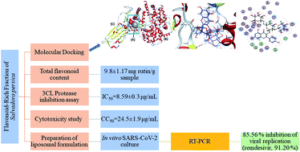We are very pleased to introduce Asmaa Ibrahim, corresponding author of the paper ‘Flavonoids of Salvadora persica L. (meswak) and its liposomal formulation as a potential inhibitor of SARS-CoV-2‘. Her article has been very well received and handpicked by our reviewers and handling editors as one of our HOT articles. Asmaa told us more about the work that went into this article and what she hopes to achieve in the future. You can find out more about Asmaa and her co-authors and their article below and find more HOT articles in our online collection.
Meet the authors
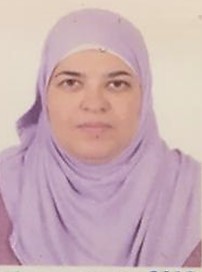 Dr Asmaa Ibrahim is an Associate Professor of Pharmacognosy at the Faculty of Pharmacy, Heliopolis University and Beni-Suef University. She obtained her B.Sc., M.Sc. and PhD in Pharmaceutical Sciences (Pharmacognosy) from the Faculty of Pharmacy, Cairo University. Her field of specialization is production of medicinal plants, isolation, structure elucidation, analysis and testing biological activity of natural products especially those related with COVID-19.
Dr Asmaa Ibrahim is an Associate Professor of Pharmacognosy at the Faculty of Pharmacy, Heliopolis University and Beni-Suef University. She obtained her B.Sc., M.Sc. and PhD in Pharmaceutical Sciences (Pharmacognosy) from the Faculty of Pharmacy, Cairo University. Her field of specialization is production of medicinal plants, isolation, structure elucidation, analysis and testing biological activity of natural products especially those related with COVID-19.
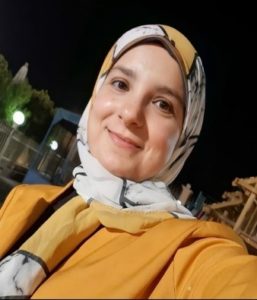 Marwa Salah Elhawary received her B.S. degree in Pharmaceutical sciences from Nahda University Beni suef in 2013. She joined Deraya University in Minia as a Teaching assistant at the department of Pharmacognosy. Her research focused on the isolation of active constituents from plants to develop various and unique biological activities of natural products.
Marwa Salah Elhawary received her B.S. degree in Pharmaceutical sciences from Nahda University Beni suef in 2013. She joined Deraya University in Minia as a Teaching assistant at the department of Pharmacognosy. Her research focused on the isolation of active constituents from plants to develop various and unique biological activities of natural products.
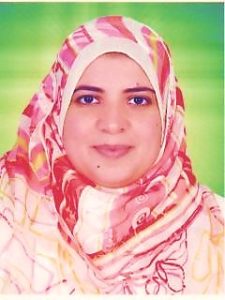 Dr Dalia El Amir received her PhD in Pharmacognosy from Beni-Suef University, Egypt (2015). She is now a lecturer of Pharmacognosy at faculty of Pharmacy. She is interested in natural products isolation and structural elucidation using spectroscopic and metabolomic techniques to discover lead compounds as anti-infectives.
Dr Dalia El Amir received her PhD in Pharmacognosy from Beni-Suef University, Egypt (2015). She is now a lecturer of Pharmacognosy at faculty of Pharmacy. She is interested in natural products isolation and structural elucidation using spectroscopic and metabolomic techniques to discover lead compounds as anti-infectives.
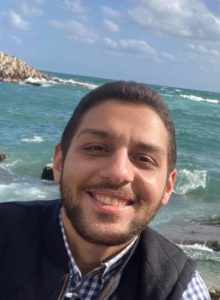 Hesham Refaat received his B.S. and M.S. degrees in Pharmaceutical sciences and Pharmaceutics from Minia University. In 2017. He joined in Deraya University in Minia as a Teaching assistant at the department of Pharmaceutical technology. His research focused on the delivery of natural products through the development of various nanocarrier systems such as liposomes and spanlastics.
Hesham Refaat received his B.S. and M.S. degrees in Pharmaceutical sciences and Pharmaceutics from Minia University. In 2017. He joined in Deraya University in Minia as a Teaching assistant at the department of Pharmaceutical technology. His research focused on the delivery of natural products through the development of various nanocarrier systems such as liposomes and spanlastics.
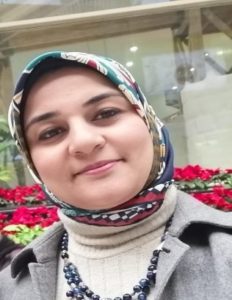 Dr Eman Alaaeldin is an assistant Prof. of Pharmaceutics at Faculty of Pharmacy, Minia University/Egypt. She received her Ph.D. in Pharmaceutics from Minia University (2015) under the channel system and joint supervision scheme between Minia University and Tokushima University/Japan. Dr Eman’s research interests are currently focused on design and development nanocarriers and targeted delivery of drugs.
Dr Eman Alaaeldin is an assistant Prof. of Pharmaceutics at Faculty of Pharmacy, Minia University/Egypt. She received her Ph.D. in Pharmaceutics from Minia University (2015) under the channel system and joint supervision scheme between Minia University and Tokushima University/Japan. Dr Eman’s research interests are currently focused on design and development nanocarriers and targeted delivery of drugs.
 Dr Omar Mohammed Aly is a Professor of Medicinal Chemistry, Faculty of Pharmacy, Minia University, Egypt. Dr. Omar worked ahead of the medicinal and organic chemistry department from September, 2009,till 2015. Prof. Omar’s research interest is focused on computer-aided drug design and the discovery of new anticancer and antiviral drugs.
Dr Omar Mohammed Aly is a Professor of Medicinal Chemistry, Faculty of Pharmacy, Minia University, Egypt. Dr. Omar worked ahead of the medicinal and organic chemistry department from September, 2009,till 2015. Prof. Omar’s research interest is focused on computer-aided drug design and the discovery of new anticancer and antiviral drugs.
 Dr Mahmoud Abdul-Aziz Elrehany is a Prof. of Biochemistry at Faculty of Medicine, Minia University, Egypt. He is graduated from faculty of Pharmacy, Assiut University in 1985, and received his Ph.D. in Biochemistry from Minia University in 1994. His research interests are currently focused on protein isolation, purification and characterization, also molecular biology research and gene therapy.
Dr Mahmoud Abdul-Aziz Elrehany is a Prof. of Biochemistry at Faculty of Medicine, Minia University, Egypt. He is graduated from faculty of Pharmacy, Assiut University in 1985, and received his Ph.D. in Biochemistry from Minia University in 1994. His research interests are currently focused on protein isolation, purification and characterization, also molecular biology research and gene therapy.
 Dr Mohamed S. Kamel is a Professor of natural products chemistry, Deraya and Minia Universities. He studied and carried out research in Hiroshima University, Japan, Oulu University, Finland and Hohenheim University, Germany. He got a grant for carrying out research in Japan by JSPS and got awards for international publication 4 times from Minia University. His research focused on Isolation of naturally occurring compounds from plants & plant endophytes using normal and advanced tools such as CC,MPLC and HPLC with different stationary phases, Interpretation of the compounds by using advanced techniques as EI,FAB,ESI/MS in addition to 1-and 2-D NMR procedures including H-H COSY,NOESY,HSQC & HMBC and biological investigation of the identified compounds such as antihyperglycemic,antioxidant and hepatoprotective actions.
Dr Mohamed S. Kamel is a Professor of natural products chemistry, Deraya and Minia Universities. He studied and carried out research in Hiroshima University, Japan, Oulu University, Finland and Hohenheim University, Germany. He got a grant for carrying out research in Japan by JSPS and got awards for international publication 4 times from Minia University. His research focused on Isolation of naturally occurring compounds from plants & plant endophytes using normal and advanced tools such as CC,MPLC and HPLC with different stationary phases, Interpretation of the compounds by using advanced techniques as EI,FAB,ESI/MS in addition to 1-and 2-D NMR procedures including H-H COSY,NOESY,HSQC & HMBC and biological investigation of the identified compounds such as antihyperglycemic,antioxidant and hepatoprotective actions.
Could you briefly explain the focus of your article to the non-specialist (in one or two sentences only) and why it is of current interest?
Since the emergence of the new coronavirus at the end of 2019, our tremendous interest around-the-clock was to identify a safe and effective medicine to combat COVID-19 that has afflicted the world. This study deals with potential inhibitors of SARS-CoV-2 virus from a natural plant and proved this postulate through a laboratory basis and not just a virtual study.
How big an impact could your results potentially have?
It was worthy to find a cheap, readily available, safe natural source for promising anti-SARS-CoV-2 agents if administered during outbreak, could help to protect from person-to-person transmission, prevent disease progression and limit viral load. The results move towards producing a drug that can eradicate the COVID-19 epidemic.
Could you explain the motivation behind this study?
The world health organization (WHO) declared SARS-CoV-2 as a world health emergency pandemic. Unfortunately, COVID-19 cases and deaths are still steadily increasing due to its rapid human to human transmission, leading to a massive strain on healthcare system, with several reports of inadequate medical supplies and deaths of hospital workers. Hospitals are forced to face the kind of life-and-death choice encountered only in times of war. Moreover, few non-approved protocols are being used to treat laboratory-confirmed or suspected COVID-19 patients with serious side effects. All these factors motivated us to hopefully find a cure for this pandemic.
In your opinion, what are the key design considerations for your study?
The key design is to experimentally inspect a mixture of eleven flavonol glycosides prepared from Salvadora persica that was hypothesized from molecular docking study to affect SARS-CoV-2 through inhibiting Mpro and blocking contact surface of hACE2-COVID 19 spike protein complex.
Which part of the work towards this paper proved to be most challenging?
The most challenging part is the comparison of RT-PCR test results of flavonol mixture and its liposomal formulation with that of the FDA-approved anti-COVID-19 agent, remidisivir. Encapsulation in the form of liposomal formulation resulted in a significant improvement in human coronavirus inhibition by 2.25-fold than un-encapsulated fraction approaching that of remidisivir. Moreover, when we tested the cytotoxicity effect of flavonol mixture, we found that it had established a safety profile for human use. This study represents a transition step from a screening computational hit to a practical laboratory-based proof.
What aspect of your work are you most excited about at the moment?
Surprisingly, Salvadora persica or chewing stick, commonly known in Arabic as Meswak, is one of the popular plants between Muslims as oral hygiene tool that could leak its anti-SARS-CoV-2 phytochemicals in the aqueous saliva during regular mechanical use as a brushing tool.
What is the next step? What work is planned?
Clinical studies will be continued recently for further investigation of the anti-viral and the anti-inflammatory effects of the liposomal formulation prepared from the flavonol mixture of S. persica on treatment of COVID-19 patients.
Flavonoids of Salvadora persica L. (meswak) and its liposomal formulation as a potential inhibitor of SARS-CoV-2tudies
Asmaa I. Owis, Marwa S. El-Hawary, Dalia El Amir, Hesham Refaat, Eman Alaaeldin, Omar M. Aly, Mahmoud A. Elrehany and Mohamed S. Kamel
RSC Adv., 2021,11, 13537-13544
DOI: 10.1039/D1RA00142F, Paper
 Submit to RSC Advances today! Check out our author guidelines for information on our article types or find out more about the advantages of publishing in a Royal Society of Chemistry journal.
Submit to RSC Advances today! Check out our author guidelines for information on our article types or find out more about the advantages of publishing in a Royal Society of Chemistry journal.
Keep up to date with our latest HOT articles, Reviews, Collections & more by following us on Twitter. You can also keep informed by signing up to our E-Alerts.


